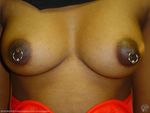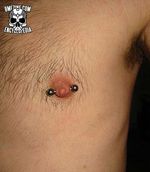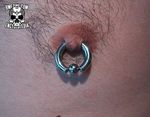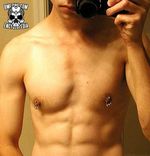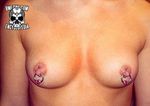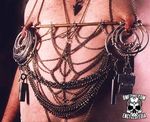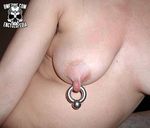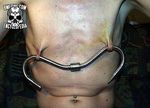Nipple Piercing
Contents |
Placement
Nipple piercings are typically placed at the base of the erect part of the nipple. The jewelry should not go through the fatty tissue of the areola as that could lead to mastitis.
For men (or women), it doesn't matter which side you get pierced — there is no meaning to getting either the left or right done. Nipple piercings can be placed horizontally, vertically, or any angle in between. It is also not uncommon to see two intersecting piercings on the same nipple!
Placement may be difficult if your nipples go completely flat when they are flaccid. If your nipples are prone to this make sure your piercer sees your nipples when they are flaccid and make sure to tell him/her. If your practitioner is not made aware of this ahead of time you may experience more discomfort than necessary. If your nipples have the tendency to do this, the balls may press into the areolas leaving indentations, redness, and possibly excess swelling. For cases like these tygon is recommended, since it will bend with your body instead of being stationary.
Procedure
Nipples can be pierced either clamped or freehand, with a needle. They are commonly considered to be one of the more painful locations to pierce.
Long term health issues
There is no evidence that nipple piercings lead to cancer or any other serious problems — however, in very rare cases, a nipple piercing may block a milk duct, trapping an infection inside the breast (mastitis). Should this happen (you should be able to feel a lump), immediate medical attention is essential - mastitis can be fatal. (Note that this is very rare).
Jewelry
Nipple piercings usually done in 14 gauge or larger in men, and 16ga or larger for women. If a ring is used it should be of a large enough diameter to accomodate initial swelling — a small ring can induce rejection or migration. Nipples can be pierced with barbells, rings, or practically any jewelry on the market. To help prevent infections such as mastitis, the jewelry must not have defects in the part the goes through the piercing. Even small nicks in the material(s) can harbor bacteria.
History and culture
As to the history of the male nipple piercing, Paul King writes,
- First of all, Roman Centurions did not have their nipples pierced. Over the years it has been my great pleasure to have many long discussions with Jim Ward, founder of Gauntlet, PFIQ, and long-time friend of Richard Simonton (aka Doug Malloy). Jim has told me the genesis behind this urban legend. It appears that Doug's only evidence of the Romans having pierced nipples was a photograph of a baroque statue from Versailles. In the photo the statue is wearing a breastplate with rings for attaching a cape. When Jim conveyed his doubts about Doug's rather stretched conclusions, Doug replied, "Well, it makes a good story..."
That said, pierced Roman breastplates have been seen, and it is known that the Romans were aware of body piercings such as foreskin piercing. It is safe to assume that at least a small number of Roman fetishists applied these piercings to real nipples, not just metal ones.
Paul continues,
- It appears that the Karankawa Native Americans, an extinct nomadic people previously inhabiting the Gulf Coast of Texas "pierced the nipples of each breast and the lower lip with small pieces of cane." That they could heal these piercings is particularly interesting since "they smeared their bodies with a mixture of dirt and alligator or shark grease" to thwart mosquitoes.
- Both American and British sailors have passed legends of getting pierced as an initiation for having crossed an important latitude or longitude. There is enough folklore and photos to substantiate tales of "sailors with pierced nipples adding links for each time the sailor crossed the equator." However, the adding of links seems to be a lesser known practice. Since the turn of the century, sailors such as Le Captain Ringman or The Great Omi, heavily tattooed and pierced, would sometimes re-enter mainland society as human oddities.
- The 1950s and 1960s were a time for self-exploration and sowed the seeds of the modern day Body Modification and SM communities. Men such as Fakir Musafar (Roland Loomis) and Jim Ward felt compelled to pierce their own nipples, and bravely figured out their piercings in an information vacuum.
Older piercing icons such as The Incredible Til reliably date their nipple piercings as far back as the 1930s.
Female nipple piercing has a broader Western history. Paul King writes,
- Quoting Fuch's writing as the source, Hans Peter Duerr's book, Dreamtime, traces the earliest known practice of female nipple piercing to perhaps the Court of Queen Isabella of Bavaria. Her rule (1385 to 1417) was short-lived but extravagant.
- "Queen Isabella... introduced the 'garments of the grand neckline', where the dress was open to the navel. This fashion eventually lead to the application of rouge to freely-displayed nipples (those 'little apples of paradise'), to placing diamond-studded rings or small caps on them, even piercing and passing gold chains through them decorated with diamonds, possibly to demonstrate the youthful resiliance of the bosom."
Eduard Fuch is again quoted by the author Stephen Kern in Anatomy and Destiny. This time the reference is much later and from a different source. "In the late 1890s, the 'bosom ring' came into fashion briefly and sold in expensive Parisian jewelry shops. These 'anneaux de sein' were inserted through the nipple, and some women wore one on either side linked with a delicate chain. The rings enlarged the breasts and kept them in a state of constant excitation. This provocative combination was rare."
The mid 20th century brought a flurry of sensational books on sex. The following passage is from a book called The Golden Age of Erotica:
- "No more perfect example of Victorian extremism can be found than the unbelievable breast piercing craze that swept London in the 1890s. This barbaric practice achieved fantastic popularity among seemingly sane, civilized Englishwomen, who submitted to the excrutiating pain of having their nipples pierced in order to insert gold and jewelled rings.
- In an attempt to explain what had driven so many females to embrace such a crackpot fad, a fashionable London modest wrote a letter to a popular magazine, which said in part:
"Fore a long time I could not understand why I should consent to such a painful operation without sufficient reason. I soon however came to the conclusion that many ladies are ready to bare the passing fashion for the sake of love. I found the breasts of the ladies who wore rings were incomparably rounder and fuller developed than those who did not. My doubts were now at an end... So I have my nipples pierced, and when the wounds healed, I had rings inserted... With regard to the experience of wearing these rings, I can only say that they are not in the least uncomfortable or painful. On the contrary, the slight rubbing and slipping of the rings causes in me a titillating feeling, and all my colleagues to whom I have spoken on this subject have confirmed my opinion".
Fuch's French joined with Jones' and Hurwood's English references of the same period seem to support the notion of a brief but extraordinary fashion trend.
After the 1890s the female nipple piercing seems to go completely underground. References or photos are untraceable until the quite remarkable piercing legend, Ethel Granger. For those unfamiliar with Ms. Granger, she appeared in the first edition of the Guinness Book of World Records. She was entered as the smallest waist in the world. With strong encouragement from her husband, Ethel started modifying her body when she got married in the 1920s. By World War II, she had both her nipples pierced and over ten ear piercings in each ear, many of them stretched or punched, including her conch. She had one piercing in each nostril and one in her septum. She could connect them by running a knitting needle from one nostril, through the septum, and out the other nostril. Certainly there were more women with secretly adorned nipples, but printed marterial remains elusive.
From the 1890s onward both men and women of European and American societies were having their nipples pierced. However, it appears very early on that female nipple piercing was performed within the fashion-conscious affluent classes while male nipple piercing was practiced by the working class fringe (mostly sailors and carnies). While the stylish quickly dropped the practice, those finding significant in the ritual or ornamentation in their lifestyle carried on the tradition. In the latter half of the 20th century, it appears not much has changed.
Reference
<any materials cited in the article should go here. Web materials should be linked, textual materials should be properly cited, as in a bibliography.>
Related Risks
See Also
- Breast feeding
- Inverted Nipples
- Small Nipple Ring
- Short Nipple Barbell
- Third Nipple
- Third Nipple Piercing
More pictures and experiences on nipple piercing can be found on BME in the nipple piercing gallery.
